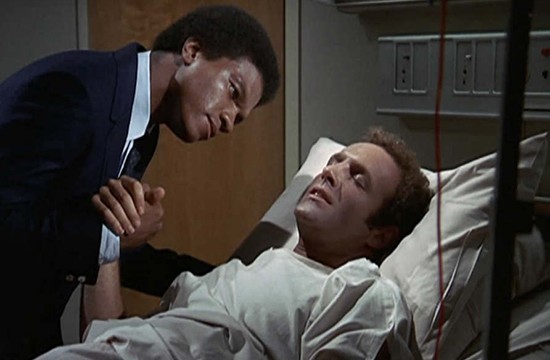“It’s only a TV show.”
—my mom, as I cried over the last episode of Quantum Leap
“Although I cried at the end of The Dirty Dozen.”
—Tom Hanks, Sleepless in Seattle
He and Victor Garber apparently ad-libbed that whole sequence. This is why Rita Wilson is literally shaking as she’s trying to keep from laughing. Imagine being there and watching them do that, never having seen any of it before. You’d probably laugh, too, and she’s supposed to be dealing with various other emotions at the same time, so brays of laughter are probably out of character.
It is a legitimate point, though. What makes you cry, when you’re watching a movie? For some people, nothing. It’s fiction, and they know it’s fiction, and what is there to cry over? I suppose I get that, probably more than they get the sheer number of things that make me cry. However, the history of crying over fiction is a very old one, probably as old as fiction itself. The Greeks called it catharsis.
I’m a very emotional person, personally. I’m almost embarrassed to list all the things that have made me cry, both movies and TV shows. I can list at least three books where I was up reading them very late at night and had to work hard not to wake my boyfriend up with my crying, and it one case, it wasn’t even when a character died. It was earlier in the book, when another major moment occurred. And when I confronted the author of that one at a con the next year, I only had to give him one detail of my personal life for him to know exactly where in the book I’d cried and why.
It’s a spoiler, of course. The moments that make us cry almost always are, one of the notable exceptions being Up, where everyone who cried (including me) did so in the first fifteen minutes. Mostly, though, we cry over character deaths or partings, and those are mostly at the end. The theory, I believe, is that these deaths and partings tap into our own, and the characters’ pain reminds us of our own, and we’re really crying for ourselves.
Which makes sense, I guess, though it does leave open the question of why things leave some people unmoved while others with similar experiences cry like babies. Not only that, but there are a handful of movies that are Approved Guy Weepies, things like Brian’s Song and Tombstone, where you’re allowed to cry even if you have a Y chromosome. (Yes, I cried at Tombstone, in part because Val Kilmer was so gorgeous in 1995; I have not seen Brian’s Song.) Your own personal experiences don’t really matter in those cases; they are approved, and you’re allowed to cry.
What I wonder is if people are more likely to cry in theatres, as audiences to comedies are apparently more likely to laugh. This, I suspect, probably has a bit of a gender divide; women are allowed to cry in our society, so the times I’ve been with girls sobbing over Swing Kids or Roman Holiday (in the theatre, on the former; I cry every single time on the latter and have been in several groups of sobbing girls/women) are acceptable. I saw Toy Story 3 with a male friend and was pleased that he let himself tear up in the same place I did, but the impression I get is that there’s a certain resistance to the idea when you’re with a group of guys.
Heck, Tom Hanks and Tim Allen were on opposite sides of an empty theatre, screening Toy Story 2 (yup, I cried), and they surreptitiously checked each other out and tried to hide their own tears during “When She Loved Me.” It hadn’t been released yet, so it wasn’t on the Approved Guy Weepies list. I don’t know if it is now; I don’t know who sets these things. Still, there’s something to this if even that nice Tom Hanks had to pretend he wasn’t crying.
I think crying at movies is a form of empathy. One of my favourite moments of Shakespeare in Love (no, I didn’t cry) is toward the end, when the nurse is sobbing over the play. She knows it’s a play; she’s cared for the actress for many years. On the other hand, she’s so involved in the story that she manages to fool herself in the moment that Viola is really Juliet and is really waking to find her lover dead. She has projected herself into the story. When we cry with Carl and Ellie, it is because we understand their grief and can understand where it comes from, even if we ourselves have never sat in a doctor’s examining room to have our hopes dashed.

